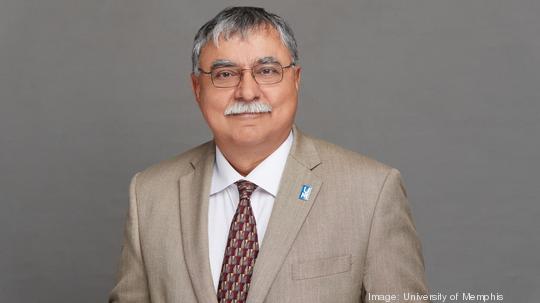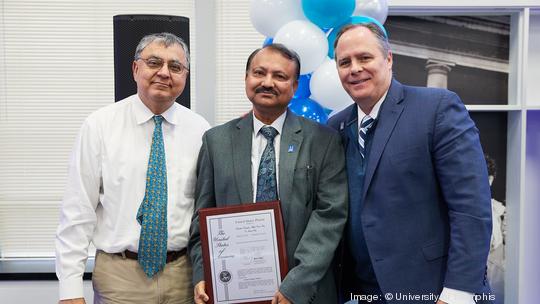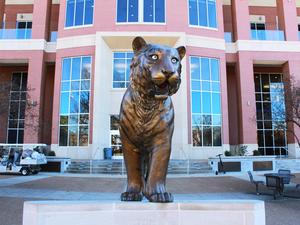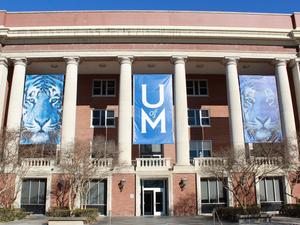
Across the American Inno network of publications that covers 45 cities in the U.S., the Inno Fire Awards highlight innovative organizations and people who have had a year worth celebrating. Honorees could be startups, accelerators, or nonprofits buoying startups. They could be researchers or institutional leaders who rally innovators and give them the tools they need to succeed.
Memphis’ innovation ecosystem is growing swiftly, and the city isn’t short on high-caliber startups and individuals worthy of this award. There are many organizations and people in the community that could be considered “on fire.” But after careful consideration, MBJ and Memphis Inno have chosen five to highlight.
Below is a profile of one of the 2022 Inno Fire Award honorees — Jasbir Dhaliwal of the University of Memphis — and a Q&A with Dhaliwal, who heads up the university's research and innovation initiatives.
Jasbir Dhaliwal
EVP of Research and Innovation, University of Memphis
On occasion, you used to hear a cheap nickname that no-nothings would toss around when referring to the University of Memphis: “Tiger High.” It was an unfounded insult, and one that ignored not just the school’s many bright and hardworking students, but also its array of alum who have gone on to have successful careers.
These days, however, that nickname would be downright absurd — especially when you consider the U of M’s recent success in research.
In December 2021, the U of M gained R1 status from the Carnegie Classifications of Institutions of Higher Education, a highly coveted and competitive research designation that could be a boon not just for the university, but the entire city.
The R1 status established the U of M as a top-tier research institution, and obtaining it wasn’t easy. In December 2018, when the school decided to wholeheartedly pursue R1 status, consultants said it would take 10–20 years.
But the U of M persisted — and spearheading the effort was Jasbir Dhaliwal, Ph.D., U of M’s EVP of Research and Innovation.
With Dhaliwal playing a key role, the U of M attained R1 status in just three years. The number of research awards faculty earned grew significantly, and in FY 2021, the school eclipsed $50 million in research awards for the first time.
But Dhaliwal and co. aren’t resting on their laurels.
Once you earn R1 status, you must retain it. And Dhaliwal doesn’t have any intention of letting the school’s newfound distinction slip away. This Q&A has been edited for clarity and space.

MBJ: What have been the biggest highlights of 2022 for you and the U of M?
Jasbir Dhaliwal: Successfully achieving our long-standing aspiration to be a top-tier Carnegie R1 research institution is definitively the highlight. Being recognized by the governor and our state legislature as one of now two flagship public research R1 universities in Tennessee is certainly special.
What big wins has the U of M had in research funding this year? Our research enterprise continues to grow on a great trajectory, and we are holding this new level even as our top research stars get maxed out in terms of their research capacity. We are able to do this because more and more of our faculty is stepping up to secure external funding for their research: We had 40 new first-time principal investigators on successful grants this year, which is a record. The biggest win this year certainly is Dr. Richard Irwin landing a single, $25 million award from the state, which beats our prior top mark.
Have you made any new hires in the past year, and what are your hiring plans in 2023? The federal government is investing strongly in research now, given that scientific and technological leadership has become the basis for international competition. On the other hand, research capacity, especially in the number of Ph.D.s available to do the science, takes a longer time to grow. Like most universities, we need to compete very hard to get the top research talent to Memphis, and some turnover is to be expected. The state’s allocation of $50 million toward a research endowment, which we are now matching 1:1 with donations for new professorships and research chairs, is helping us keep our top research talent and recruit new research experts. You will be hearing a lot about new professors and chairs of excellence moving to Memphis in the coming years and bringing along with them their top research staff, doctoral students, and federal research contracts.
You’ve been selected for this honor because your organization has been, in a sense, “on fire.” What’s been the fuel that’s kept this flame burning? The passion of our research faculty. Everyone on campus bought into the common unifying goal of becoming a Carnegie R1 institution, which underpins our rapid research success. It is easy to lead and steer such a motivated research organization. We are a completely different and confident research institution now compared to a decade ago, and that will keep us going for bigger and bigger opportunities and taking on larger research challenges. A new research culture has truly emerged on campus.
What are your key areas of focus for 2023? Our razor-sharp focus on research growth is going to continue, and I want to focus more on fostering greater interdisciplinary discourse and collaboration on campus. The traditional markers between disciplines are disappearing quite rapidly, and innovation opportunities abound where boundaries get blurred. That is where our university needs to be to lead in research for the longer term.
What do you think the biggest opportunities and challenges will be next year? My focus in past years has been largely internal, as we had much to do. I was recently elected by my national peers to the executive committee of the Council of Research at the Association of Public & Land-Grant Universities. Going forward, this will help me ensure that the university gets to play a larger role in helping shape the national agenda and landscape for research, plus have a larger national research profile. Seeing the research progress our faculty is making tells me that we can now go beyond following to proactively helping to shape national research priorities. This will bring us larger opportunities that have national impact and are more pertinent to our regional economy and community. Given that 72% of research awards come from the federal research agencies, the biggest challenges will of course be to learn quickly about how things work in our national capital, from a research spending perspective. Ensuring that we continue recruiting and bringing to Memphis the top research talent internationally must also continue.
Where do you see your organization one year and five years from now? I am confident that our research enterprise will continue to grow, thereby helping to ensure that millions more in federal research dollars will be spent locally. More importantly, we will see a lot more research faculty, staff, and students join our local communities, helping to raise the intellectual discourse in our society and modernize our city. As the city’s primary comprehensive research university, it is our responsibility to foster an educated community that is a player in national ideas and development. That, together with the reputational lift that comes with it, will change how we are viewed in the future.








